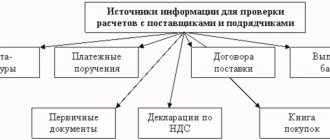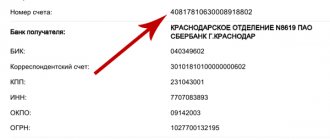Important! Individual entrepreneurs (IP) are not required to keep accounting records and submit financial statements. However, if they want to lead it, they have the right to do so. Article 346.24 of the Tax Code of the Russian Federation states that individual entrepreneurs must reflect their income and expenses in the “Book of Income and Expenses”. It was approved by Order of the Ministry of Finance No. 135n dated October 22, 2012. Also, Law No. 402-FZ “On Accounting” dated December 6, 2011, in paragraph 2 of Article 6 states that individual entrepreneurs, if in accordance with Russian legislation they keep records of income or income and expenses, may not keep accounting records. Thus, if an individual entrepreneur keeps a “Book of Income and Expenses,” he may not keep accounting records, since in this case the requirements of Russian legislation are met.
However, in some situations it will be necessary to maintain accounting records. For example, individual entrepreneurs who are on the simplified taxation system (STS) are required to control the residual value of fixed assets. It should not exceed 150,000,000 rubles. And it is necessary to control the residual value limit using PBU 6/01. This is stated in subparagraph 16 of paragraph 3 of Article 346.12 of the Tax Code of the Russian Federation.
Example. An individual entrepreneur bought real estate in the amount of 20,000,000 rubles in November. In addition, he has property with a residual value of 120,000,000 rubles. An individual entrepreneur is subject to a simplified taxation system. The method of calculating depreciation is linear. The service life of the property purchased in November is 30 years (30*12 = 360 months). The monthly depreciation amount is:
20,000,000 x 1/360 = 55,555.56 rubles
The total residual value of the property at the end of November is:
20,000,000 – 55,555.56 = 19,944,444.44 rubles
19,944,444.44 + 120,000,000 = 139,944,444.44 rubles
Thus, the limit on the residual value of real estate is less than 150,000,000 rubles.
In addition, individual entrepreneurs are required to observe cash discipline. Therefore, if an individual entrepreneur keeps accounting records, then when depositing personal funds into the cash register, he will need to issue an incoming cash order, and when withdrawing money, an outgoing cash order. The basis can be indicated as “Depositing personal funds to the cash register” or “Withdrawing personal funds. At the same time, you need to understand that the personal funds of an individual entrepreneur are not taxable income. If an individual entrepreneur does not keep accounting records, then all transactions are reflected only in the book of income and expenses.
Let's summarize:
- if an individual entrepreneur decides to keep accounting records, then any operation on the cash register or current account must be documented with accounting entries, and it is also necessary to maintain a cash book;
- If an individual entrepreneur decides not to keep accounting records, then he only needs to take into account income and expenses. Therefore, there is no need to maintain a cash book and draw up receipt and expense orders.
If an individual entrepreneur decides to keep accounting records, then it is necessary to correctly reflect business transactions. We will consider transactions related to current accounts in this article.
How can individual entrepreneurs pay?
According to Russian legislation, individual entrepreneurs are liable for their obligations in full with all their property, but at the same time they have the right to dispose of their income without any restrictions . This means that an individual entrepreneur can at any time withdraw any amount from the turnover and use it for personal purposes, as well as deposit any amount into the account for use in business activities.
Individual entrepreneurs can pay using cash and non-cash methods. Basically, all payments between legal entities and individual entrepreneurs pass through a current account. If the proceeds from the sale of products, works or services are credited to the bank account of an individual entrepreneur, then the following transactions must be made.
| Business transaction | Wiring |
| An individual entrepreneur sold his products (works, services) | Debit 62 / Credit 90.1 “Revenue” |
| VAT charged | Debit 90.3 / Credit 68 |
| The individual entrepreneur received the proceeds, which were credited to his bank account | Debit 51 / Credit 62 |
If an individual entrepreneur is not exempt from operating an online cash register (currently there is a list of those exempt from operating an online cash register), then when paying in cash, he must have a cash register in accordance with Law No. 54-FZ of May 22, 2003 “On the use of cash registers.” -cash equipment when making payments in the Russian Federation.” However, by July 1, 2021, all individual entrepreneurs are required to switch to online cash registers. The cash register must be registered with the tax office. The list of individual entrepreneurs exempt from the use of online cash registers is listed in Law No. 54-FZ of May 22, 2003. These include, for example, entrepreneurs:
· providing people with small household services, such as nanny services,
· as well as those selling certain goods, such as ice cream, newspapers, magazines, etc.
| Business transaction | Wiring |
| An individual entrepreneur sold his products (works, services) | Debit 62 / Credit 90.1 “Revenue” |
| VAT charged | Debit 90.3 / Credit 68 |
| The individual entrepreneur received the proceeds, which went to his cash desk | Debit 50 / Credit 62 |
| Cash from the cash register was deposited in the bank | Debit 51 / Credit 50 |
Is personal money of an individual entrepreneur subject to tax?
The money remaining after paying taxes, withdrawn from the account for personal purposes, is not subject to tax. This is due to the fact that these funds are not income. That is, they cannot be considered a taxable base.
Let's consider another situation. An individual entrepreneur using the simplified tax system deposited personal money into the cash register. Will they be considered income for the purpose of calculating personal income tax and the single tax? No, they are not recognized as income. Consequently, there is no taxable base.
FOR YOUR INFORMATION! Despite the fact that personal money is not taxed, an individual entrepreneur must take into account the associated risks. In particular, the risk that the tax office will decide to charge additional taxes. In this case, you will most likely have to resolve the issue in court.
How can an individual entrepreneur replenish his current account?
An individual entrepreneur can replenish his current account in the following ways:
- depositing funds directly into a bank account;
- depositing funds into a current account through terminals and bank cards;
- with the help of collectors.
Depositing funds into a current account by an individual entrepreneur does not require any formalization from him, unlike a legal entity. There are also no restrictions on the number of open current accounts.
How to top up an individual entrepreneur's current account
According to the status, an individual entrepreneur personally manages his property and finances, including funds in his current account. The businessman himself decides when and how much to deposit, withdraw or to whom to transfer money.
You can top up your account in the following ways:
- Deposit funds through the cash desk of the bank in which the current account is opened. The advantage of this method is the absence of commission.
- Replenishment through third-party banks using the details. The commission for transferring money between financial institutions varies; its size is set individually in each bank.
- Transfer money through payment systems Rapid, Qiwi, Eleksnet, Unistream. Funds are received within 1 business day, however, you will need to pay a fee.
- If you have an open debit card “linked” to your account, you can top it up through an ATM of any bank with a cash deposit function. ATMs operate around the clock, which is undoubtedly convenient during an active business life. Cash cards, when used at ATMs of the issuing bank, can be used without a commission; at third-party ATMs, a commission may be charged, depending on the terms of the agreement.
- Transfer funds between accounts. If an entrepreneur has one or more accounts in addition to the current account, you can transfer funds through the Internet banking system. If the accounts are all in one bank, it is possible that the transfer will be made without commission and within a few minutes, in different ones - up to 2 business days with low costs. The convenience of this method lies in the ability to deposit money without leaving your home.
When replenishing an account, an individual entrepreneur will not pay any taxes, since this operation is not classified as income from business activities.
How to record the receipt of funds into a current account through a collector
The cash collector can hand over the money to the bank. In this case, it is also necessary to reflect the issuance of funds through account 57, because the money goes to the current account through an intermediate link - the collector.
| Business transaction | Wiring |
| Cash issued to collectors | Debit 57 / Credit 50 |
| Cash handed over to the bank by collectors | Debit 51 / Credit 57 |
Personal funds reflected in 1C: Accounting
In the process of work, regardless of the type of activity of the organization, the entrepreneur uses the 1C program.
The total amount entered into the documents in connection with its posting is not reflected in reports to the tax authorities. A document confirming the receipt of money is generated at the time of depositing funds into the cash register. Be sure to fill out the columns “Base” and “Appendix”. Next, posting Dt 50.01 Kt 84.01 is generated. If an individual entrepreneur deposits his money into a current account, it is necessary to indicate the type of transaction and issue posting D151 Kt 84.01.
If a private entrepreneur spends money from his current account for personal needs, he can reflect the entire progress of the operation in the 1C system. For these purposes, account 75 is used, indicating the mechanism for working with founders. An entrepreneur just needs to issue a check, which can be used to withdraw money. Subsequently, documents are drawn up that take into account the inflow and outflow of funds in the individual entrepreneur’s account.
To withdraw money for personal expenses, an entrepreneur draws up a document that takes into account tax and accounting and records: debit (amount), credit (amount). After the pension tax has been withheld, debits and credits are noted again.
Common questions regarding individual entrepreneur current account
Question. How to reflect the receipt of personal funds of an entrepreneur into the current account?
Answer. Individual entrepreneurs have the right to freely dispose of their funds, then the receipt of funds into the current account and withdrawals from the current account can be reflected in the following entries, using account 76 “Settlements with various debtors and creditors”. You can open a “Personal Funds” subaccount for account 76.
Debit 51 / Credit 76 subaccount “Personal funds”
Withdrawals of money from the account for personal needs must be reflected by posting
Debit 76 “Personal funds” / Credit 51
We take into account funds on the balance sheet
Depositing your own money into the individual entrepreneur’s cash register must be carried out in compliance with the requirements of the legislation on accounting and taxes. An important feature is that there is no need to reflect the receipt of personal funds in the book of income and expenses!
These statements show only income related to the results of the company's activities. This includes revenues from sales and non-sales. According to Article 250 of the Tax Code, an entrepreneur’s own amounts are not included as such.
To justify the incoming payment, you need to have a strict reporting form indicating:
- Deposit amounts;
- Current account numbers;
- Account number of the individual from which the transfer was made (that is, yours);
- Operation dates;
- Name of the banking institution;
- Transfer destinations.
On the receipt order there should be a phrase in the purpose of payment approximately as follows: “Replenishment of the current account with personal funds.” This formulation will allow you to avoid problems with the tax authorities in the future.
When depositing personal money, you must be aware that you can only top up your individual entrepreneur’s account. Transferring your own funds to someone else's account is not allowed. The bank will refuse you this operation.
If you transferred your own money to the company’s cash desk to issue earnings to employees, then this operation is also not reflected in the book of income and expenses. In this case, it is necessary to generate strict reporting forms that will confirm the issuance of funds to employees.
To reflect personal funds on the balance sheet of an individual entrepreneur, use account 72. The 50th account will appear in the “Debit” column. If the capitalized funds will be used for settlements with creditors and debtors in the future, then settlements will be carried out using account 76.
If a third party deposits money into an individual entrepreneur’s account
Any contribution by a third party (relative, friend, partner) of funds to the account of an individual entrepreneur can be regarded by the tax authorities as income. Even a transfer made by a spouse through a bank cash desk will be subject to taxes, no matter what purpose of payment he or she indicates.
Another option is corporate plastic cards. Today, many banks (Promsvyazbank and others) provide them to their clients for a fee. For example, a cashier at a retail outlet may have such a card. This way he will receive the right to close a shift without the participation of the owner of the company, as well as to replenish the account with cash proceeds through an ATM. But even in this case, the amount received will be income.
You can avoid the accrual of taxes if, even when concluding an agreement with the bank, the individual entrepreneur indicates a third party, employee or partner who has access to the management of the account. Then the bank issues a card for him with sample signatures and opens access to replenishment of the account. Or, in the presence of a bank employee, you can issue a power of attorney to a third party to replenish your account.
How to apply correctly?
When investing money in an individual entrepreneur's cash register, you should know how to correctly register the receipt of the amount. In accordance with the Directive of the Central Bank of the Russian Federation No. 3210 - U “On the procedure for conducting cash transactions by legal entities and the simplified procedure for conducting cash transactions by individual entrepreneurs and small businesses”, in this case, a cash receipt order is used, which must be signed by an accountant, cashier or directly entrepreneur.
According to clause 4.4. of this document, the transactions carried out must be confirmed by the seal of the business entity and the signature of officials. In case of registration of receipt and expenditure of funds, the corresponding statements are entered into the cash book.
In accordance with clause 4.7. According to the above procedure, the cash book and accompanying documentation can be filled out manually or in electronic form. In this case, the entries made must be accompanied by the signature of officials. If the entrepreneur has chosen an electronic method of accounting and document flow, then in this case the certification of the transactions carried out is carried out using an electronic digital signature.
The operation of depositing funds into the cash register of an individual entrepreneur must be documented with the appropriate accounting entries, thanks to which you can subsequently see and understand what the source of the funds received and where they were sent. Registration of transactions for cash and non-cash monetary transactions is carried out using such balance sheet asset accounts as accounts 50-57. Any accounting entry made must be supported by relevant documents.
Are own funds in the cash register counted as income?
Each transaction on a company account may attract the attention of the tax authority. This is especially true for incoming transactions.
When depositing your own funds, it is important to justify them correctly. If in the purpose of the transfer you indicate that the funds being deposited are your personal savings, then there can be no claims from government agencies against you
The main thing is to save all confirmation forms from banks and store them throughout the entire period of the individual entrepreneur’s activity (preferably 4 years)
If in the purpose of the transfer you indicate that the funds being deposited are your personal savings, then there can be no claims from government agencies against you. The main thing is to save all confirmation forms from banks and keep them for the entire period of the individual entrepreneur’s activity (preferably 4 years).
If, by your own mistake, you do not indicate the correct purpose of the payment in the payment order, then it will be problematic to prove to the tax service that these funds are yours.
If the payment document for depositing funds is completed in compliance with the established requirements, then your money, of course, is not the income of the company. They are not considered a product of the individual entrepreneur’s activities, but only reflect your savings, which should not be taken into account when calculating tax payments.
Depositing funds for settlements with employees
An individual entrepreneur has every right to invest his own cash savings to finance the needs of the enterprise, including paying wages to employees.
In this case, individual entrepreneurs should adhere to the requirements regarding the procedure for conducting cash transactions, even in a simplified form. In this case, it is permitted to refuse to register cash receipts and expenditures, as well as a cash book. In this case, the operation to deposit funds must be formalized by some other document, which will be approved by the manager. And the fact of payment of wages will be confirmed by the payroll.
What do you need to know about the single tax?
Entrepreneurs who apply the “simplified tax”, instead of three main taxes (profit, property and value added) pay one (hereinafter - EN):
- or 6% of total income for 12 months;
- or 15% of the difference between income and expenses, but not less than 1% of total income.
The percentage charged under the “income” taxation scheme is unchanged. But for legal entities and individual entrepreneurs who have determined the “income-expenses” scheme as the basis, regional laws may establish a reduced tariff.
Also from 01/01/15. for individual entrepreneurs who carry out business activities in the following areas:
- education,
- the science,
- production,
For two years in a row, a zero (0%) single tax tariff is established if the individual entrepreneur meets the following requirements:
- 70% of income from economic activities relates to income in one of the areas indicated above;
- The individual entrepreneur complies with the requirements of regional law in terms of the average number of employees and the amount of total income received.
For tax purposes, all incoming and expended funds from the business or other activities of a legal entity or individual entrepreneur must be reflected in the KUDiR. Next, on the basis of the formed KUDiR, from the beginning of the year until the end of the corresponding payment period, either the amount of income or the difference between income and expenses is calculated.
Advance periods for the Unified Tax Code on the simplified tax system are 3,6 and 9 months, while the tax period is considered to be one calendar year.
Taxes
If a situation arises when an individual entrepreneur’s current account is replenished using his own funds, the question immediately arises as to whether this part of the funds in the company’s cash desk is subject to taxation. And in this case, it is important to understand that this money is not the income of the company, since it does not affect its activities and relates to an individual.
Thus, if such amounts of money are not classified as income, then there can be no talk of any payment. In this case, the entrepreneur needs to reflect the correct amount in the income statement at the end of the year in order to avoid unnecessary waste of funds.
In conclusion, I would like to add that today’s regulatory and legal framework allows entrepreneurs to solve the temporary problem of a lack of funds in the company’s account by replenishing it with their own funds. In this matter, the individual entrepreneur is only required to properly maintain accounting records and document flow for ongoing operations.
Reasons for replenishing an individual entrepreneur’s account from personal funds
The key reason why an individual entrepreneur decides to deposit his own finances into the cash register is the insufficiency of the available amount on the individual entrepreneur’s demand deposit. But the purposes for which additional injections will be used can be very different, including:
- repayment of debts to creditors;
- to make settlements with employees regarding wages;
- to replenish working capital;
- maintaining the financial condition of the company.
If an individual entrepreneur has a debt and there is not enough money to pay it off, then a good option to solve the problem is to contribute personal savings. Such a decision is especially applicable when the deadline for fulfilling obligations is approaching and income is not expected in the near future.
In order to eliminate the possibility of unnecessary problems with fiscal services, the contributed own financial resources should be processed correctly and in accordance with legal requirements. Thus, each such transaction must have documentary evidence and be correctly reflected in accounting.
According to current regulatory and legal acts, depositing one’s own finances into an individual entrepreneur’s demand deposit is not recognized as revenue. When depositing monetary resources into the bank's cash desk, a cash receipt order is filled out, which indicates the purpose of the amount being deposited.
After the transaction is completed, the individual entrepreneur will receive a receipt signed by the cashier and the stamp of the credit institution that accepted the cash deposit. After the transaction is completed, the entrepreneur will be able to receive a bank account statement, which will indicate the amount received.
It should be borne in mind that you can top up your individual entrepreneur account not only by depositing cash financial resources. This can be done through money transfer systems, as well as by transferring funds through an ATM or from the individual entrepreneur’s personal account to his current account.







